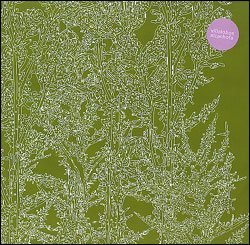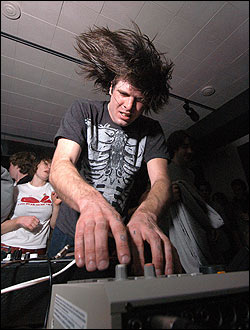IT’S AMAZING HOW little dance music actually moves. Now, I love house music like I love few things (Camel cigarettes, caramel-flavored coffee, the black Dickies jacket I’ve owned since college). But four or five hours of its relentless 4/4 fodderstompf can make me feel like I am inexorably on hell’s treadmill. Enough in my life makes me feel like that already without pop music getting in on the act, too.
Ricardo Villalobos, bless his Latin lover’s heart, takes the phrase “dance music” as a command, firing whooping six-shooter shots at the feet of stuff lesser producers would be content to let loop or throw away entirelyblurt, crackle, disintegrating percussion motifs, dust motes, glitches. Nothing Villalobos does is ever going to scuff the rococo hide of, say, Masters at Work or Deep Dish, but compared to the desiccated stump of house’s hallowed, over-mythologized history (Chicago, the Paradise Garazzzzz), his micro-microhouse productions and all-gates-open mixes are like teeming forests of mites and bacteria chattering away under the petrified bark.
Taka Taka (Cocoon), his second mix CD, is at once deceptively simple and maddeningly complex. Villalobos chops and smears the line between played and programmed percussion (on Walter Jones’ “All God’s Children,” one effortlessly morphs into the other), as well as between deep and tech-house (the rapturous four-minute transition between Brother’s Vibes’ Latin-tinged “Anos Libre” and the steely winds of Vainqueur’s “Elevation 2”). But despite his obvious technical skill, Villalobos is no neat-freak perfectionist placing every blip just so; he even obliterates his only production on the set, “Dexter,” via Errorsmith’s shrill “Stiff Neck.” Like Jackson Pollock’s “Lavender Mist” (look it up, or better yet go see it), Taka Taka is both the individual scrapings of an obsessive craftsman and a luminous blur of pure beauty.
“Alcachofa” means “artichoke” in Spanish. With Alcachofa (Playhouse), his first single-artist LP, Villalobos has added yet another pertinent plant metaphorspiny, rough surfaces protecting the juicy juice insideto the microhouse list. Mid-paced and lugubrious, the album opens with his masterpiece, “Easy Lee.” Over an itchy, reticular beat, Villalobos dryly repeats a phrase through vocoder for 10 minutes; somehow, instead of being numbingly boring, it’s totally compelling (if a bit queasy). Against an endless dub-space, the nine long tracks of Alcachofa make a virtue out of margin-scribbling detail without sacrificing the skeletal groove that is the producer’s trademark. The New York Times recently claimed him as a star in Ibiza, but it’s hard to imagine Villalobos competing with the imagination-starved “big room” house and trance booming nightly out of the most vacuous island on Earth. Instead, he marshals his little black boxes to perform odd, idiosyncratic feats that never skimp on the rump-moving front.








